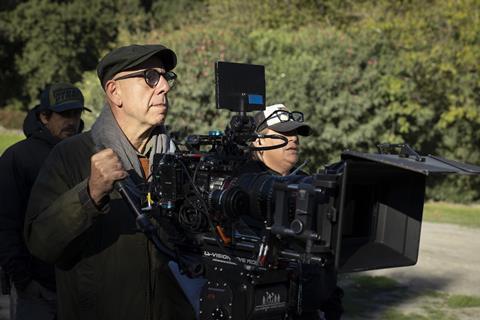
More than 30 years since his debut, Italian director Paolo Virzì is showing no signs of slowing down.
His 17th feature – and third in four years - Five Seconds [Cinque Secondi] was completed amid the funding delays endured by the Italian film industry last year. It is now premiering at the Rome Film Festival this month, ahead of its Italian release on October 30.
The film is a drama about grief and rebirth. Valerio Mastandrea, in his fifth collaboration with Virzì, plays a high-flying lawyer who has withdrawn from the world after a personal tragedy. His solitude is disrupted by the arrival of a small community of young people trying to revive an abandoned mansion. Their uneasy coexistence gradually transforms into an unexpected bond based on mutual care.
Produced by GreenBoo, Indiana Production and Virzì’s own Motorino Amaranto, the film is being sold internationally by Playtime, marking the director’s first partnership with the French sales outfit.
Virzì talks to Screen about festival strategies, financing hurdles, and the hopeful tone that underpins even his darkest stories.
Your films have premiered in Cannes (Like Crazy in 2016) and many times in Venice. How does Rome feel different?
Rome has its own logic. Cannes has the market and global buyers, but Venice and even Rome now attract international interest. Rome happens at the most commercial time of year, which gives a film real visibility in its home market.
How much say do you have in which festivals your films will screen at?
Festivals are a matter of release strategies and timing, and I prefer producers and distributors to handle that. I focus on making the film. For Five Seconds, the producers agreed Rome made sense: it’s close to the November holiday release window, the best one in Italy, and by premiering at a festival close to the release date, we can avoid duplicating the promotional push.
Yet you’ve produced the film through your own company.
Yes, but I’m a creative producer, not a real one. I use Motorino Amaranto to develop projects and then find stronger partners. The production side, budgets, sales, strategies, is managed by others.
Do you follow the international rollout of your films?
I usually travel to some of the countries when the film is being distributed there, but I don’t have a strong voice on that matter.
Five Seconds is handled by a French sales company, Playtime. How do they differ from Italian companies?
Indiana Production had worked with Playtime before. and showed me their lineup. Their team read the script early, visited during shooting, and stayed in touch throughout post-production. It’s rare to find such engagement. French sellers tend to have that instinct — they live off international circulation, and it shows.
You have mentioned before that putting together Five Seconds wasn’t easy. What happened?
We started right in the middle of confusion over the new Italian public funding rules. Marco Belardi of GreenBo Production was first on board but faced some challenges, so Indiana joined to close the gap. It’s a smaller-scale film than some of my previous ones, but the financing was oddly tougher this time. The system was in flux.
How much was the film’s subject matter influenced by what is happening in the world?
We shot it while two wars were going on, in an atmosphere of anger and exhaustion, yet the film speaks of possible alliances between classes and wounded people. It’s about a man who shuts himself off and a young woman who drags him back into life. Out of pain, something still grows.
As with your two most recent previous efforts, Dry and Another Summer Holiday, this is a film about the end of everything. But there is some hope at the end. Are you feeling more optimistic?
Maybe this time is more explicit than before. This is a film about how tenderness can arise from despair. Even when I describe humanity’s failures, I keep faith in people. Otherwise, why tell stories at all?

























No comments yet